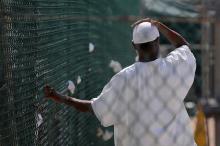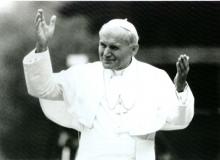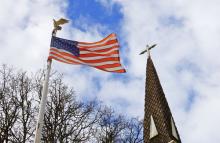Faith and Politics

Evangelist Franklin Graham blasted the Internal Revenue Service probe of conservative nonprofit groups as “un-American,” saying both the Billy Graham Evangelistic Association and the relief group Samaritan’s Purse were audited by the IRS.
In a Tuesday letter to President Obama, Graham said the two organizations he leads were notified last September that the IRS would review their records for the 2010 tax year.
The IRS inquiry, he noted, occurred months after the BGEA ran ads in April 2012 supporting a North Carolina amendment that banned same-sex marriage, which passed in May. The BGEA also ran ads last fall urging voters to consider candidates who make decisions based on “biblical principles and support the nation of Israel.”
Rand Paul has used the last few months to aggressively court evangelicals through a CBN special, a trip to Israel, and appearances with pastors. This is a shift to take Paul from a tea-party hero to a mainstream political player. Paul refers to himself as a "“libertarian Republican” to distant himself from his father's strong libertarian beliefs. The Washington Post reports:
As he openly considers a run for president in 2016, Paul’s rebranding effort is a test of his political skills as well as the state of the Republican Party. For the senator, the question is whether he can win over the establishment without upsetting his tea party base.
Read more here.

The United States has the highest incarceration rate in the world — about 1.6 million people in 2010. Mass incarceration in our country is a problem, one that too often serves to line the pockets of for-profit prisons while tearing families apart and targeting people of color disproportionately.
Beyond Bars — a project to curb mass incarceration in the U.S. — produced the following video that puts faces to that problem. Watch the moving video below, and ask yourself the question: would putting them in prison serve the common good?

Soon after the Boston Marathon bombings, local Christian leaders stepped swiftly into the public eye, convening vigils and urging peaceful healing in the wake of senseless violence.
But their public voices have fallen mostly silent as noisy resistance grows to the prospect that suspected bomber Tamerlan Tsarnaev could be buried in local soil.
Cemeteries and even some mosques have refused to take his body. His city, Cambridge, has urged family members to bury him elsewhere. Republican U.S. Senate candidate Gabriel Gomez and local talk radio host Dan Rae want him dumped in the ocean, like Osama bin Laden. Clergy have largely kept mum.
“The only signs of people who are showing some sort of moral conscience are those few who stand with a card near the funeral home saying [burial] is a corporal work of mercy,” said James Keenan, a moral theologian at Boston College. “To say, ‘we won’t bury him’ makes us barbaric. It takes away mercy, the trademark of Christians. … I’m talking about this because somebody should.”

Elizabeth Smart, who was kidnapped from her home in Salt Lake City and held in captivity for nine months in 2002 at age 14, spoke out about her experience at a human trafficking panel at Johns Hopkins University last week. Her main focus: educating children and giving them the skills to fight back.
She recounted her own experience in abstinence education.
I remember in school one time, I had a teacher who was talking about, well about abstinence. And she said, 'Imagine that you're a stick of gum, and when you engage in sex, that's like getting chewed. And then if you do that lots of times, you're going to become an old piece of gum, and who's going to want you after that?'
… for me, I thought, 'Oh my gosh, I'm that chewed up piece of gum. Nobody re-chews a piece of gum. You throw it away.'
And that's how [easy] it is to feel like you no longer have worth; you no longer have value. Why would it even be worth scraping up? Why would it even make a difference if you are rescued? Your life no longer has value.
Watch the full speech here.
On April 2, the United Nations passed an innovative Arms Trade Treaty aimed at regulating the massive global trade in conventional weapons, for the first time linking arms sales to the human rights records of the buyers. For the first time arms manufacturers and dealers will have to consider the end use of their product — how will their customers use the weapons and to make that information public. The May-June 2013 issue of Maryknoll's NewsNotes explains the potential positive impact the treat could have on women and girls:
A particular element of the Treaty that is cause for much celebration is the inclusion of language that protects women and girls from armed gender-based violence (GBV). In the Preamble of the ATT, it states "that civilians, particularly women and children, account for the vast majority of those adversely affected by armed conflict and armed violence."In the United Nations Declaration on the Elimination of Violence Against Women, violence against women and girls is defined as "any act of gender-based violence that results in, or is likely to result in, physical, sexual or psychological harm or suffering to women [or girls], including threats of such acts, coercion or arbitrary deprivation of liberty, whether occurring in public or in private life."Under Article 7.4 of the Arms Trade Treaty, GBV is included as a binding criterion for considering whether or not to export arms. The exporting party must consider the overriding risk of potential violations of international humanitarian law (IHL), international human rights law (IHRL) and must take into account the risk that the transfer will be "used to commit or facilitate serious acts of gender based violence or serious acts of violence against women and children."
Read the rest here: http://www.maryknollogc.org/article/arms-trade-treaty-global-victory-women-girls

Editor’s Note: Jim Wallis’ latest book On God’s Side: What Religion Forgets and Politics Hasn’t Learned About Serving the Common Good is sparking a national conversation of what it means to come together on issues that traditionally divide the nation. Bloggers Adam Ericksen and Tripp Hudgins are having that conversation here, on the God’s Politics blog. Follow along, and join the discussion in the comments section.
Benedict of Nursia is on my mind this morning as I ponder what it is that Jim Wallis is trying to accomplish with his new book, On God's Side. Adam Ericksen pondered the virtues of baseball, winning, and losing in his post from earlier this week. Adam questioned the metaphor. What do we do with our losers? How can we all win?
What would it mean if people of faith began transferring their human identities from class, racial, and national loyalties to a global identity in a new beloved community created by God?
~ Jim Wallis, On God's Side
Today I'm wondering about where Jim was when he started pulling all of this together. Jim shared that he went on retreat (a good practice, in my humble opinion) to gather his thoughts for this new book. He went to a monastery (also a good practice, in my humble opinion). He prayed the hours. He wandered the grounds. He spent some time in silence. He read the Narnia books and gave some serious thought of C.S. Lewis' Aslan. All of this led to a question, well, many questions, but this question I've pulled out is what caught my attention. What if, indeed, Jim. What if we were to do this thing ... the beloved community?
It is no surprise to me that this question would emerge while Jim was at a monastery. Of course it would. And that he riffs on Dr. Martin Luther King, Jr., in a way is also wonderfully telling. "Our goal is to create a beloved community and this will require a qualitative change in our souls as well as a quantitative change in our lives," said Dr. King. Our souls must change. So too must our lives. Dr. King said much about the beloved community. So too did Benedict of Nursia.
There's so much to say here. I'm a little stumped. The beloved community is the Church, but it is exemplified by the monastery where people relinquish their individual control of their worldly goods. Monastics take vows to pray and work together. There's a shared rhythm of life. There is a shared mission. It's a challenging and difficult life, and not all Christians are called to it. Obedience, stability, conversion of life. If we want to be the beloved community, then the we must avow ourselves to such a Rule. Indeed, we must give up our personal or private identities to the service of all.
But how do we do this as a culture, a global church?

Editor's Note: Below is the text of President Barack Obama's Proclamation for the National Day of Prayer.
Americans have long turned to prayer both in times of joy and times of sorrow. On their voyage to the New World, the earliest settlers prayed that they would "rejoice together, mourn together, labor, and suffer together, always having before our eyes our commission and community in the work." From that day forward, Americans have prayed as a means of uniting, guiding, and healing. In times of hardship and tragedy, and in periods of peace and prosperity, prayer has provided reassurance, sustenance, and affirmation of common purpose.
Prayer brings communities together and can be a wellspring of strength and support. In the aftermath of senseless acts of violence, the prayers of countless Americans signal to grieving families and a suffering community that they are not alone. Their pain is a shared pain, and their hope a shared hope. Regardless of religion or creed, Americans reflect on the sacredness of life and express their sympathy for the wounded, offering comfort and holding up a light in an hour of darkness.

When I got off the plane at O’Hare Airport in Chicago on my way home to Boston on April 15, I couldn’t believe my eyes. Televisions blaring everywhere showed my beloved city at her premier event of the year, the Boston Marathon. Everyone knows the rest of the story.
“Is this for real? How can this be?” I asked, unable at first to face the reality of what had occurred. Feelings of fear and anger followed quickly on the heels of the denial.
Leaders responded quickly: the mayor, the governor, the president. “Any responsible individuals, any responsible groups will feel the full weight of justice,” promised President Barack Obama.
What is justice? Vengeful words immediately spewed from talk shows and bloggers’ keyboards. “We must catch them alive and make them suffer as much as possible. That will pay them back for what they did,” spewed those who equate justice with revenge.
Of course, violence begets more violence. Gandhi put it succinctly: “An eye for an eye makes the whole world blind.” Paul exhorted the Romans, “Repay no one evil for evil, but take thought for what is noble in the sight of all. . . Beloved, never avenge yourselves, but leave it to God, for it is written, ‘Vengeance is mine, I will repay,’ says the Lord. (Romans 12:17,19.)”

It can be hard to come up with a list of countries with the most egregious records on religious freedom when some of the world’s worst offenders aren’t even nation states.
For its annual report of violators, the U.S. Commission on International Religious Freedom counts 15 nations where abuse of religious liberty is “systemic, egregious, and ongoing.”
But the commission, which was created by Congress in 1998 as an independent watchdog panel, also wants to highlight the crimes of non-nations, which for the first time this year get their own section in the report.

In today’s White House press conference, CBS News' Bill Plante raised the questions with President Barack Obama about the growing hunger strike among prisoners at Guantanamo Bay. “Is it any surprise, really,” asked Plante, “that they would prefer death rather than have no end in sight to their confinement?"
"Well, it is not a surprise to me, “ President Obama responded, “that we've got problems in Guantanamo.”
Last week, a military spokesperson confirmed that the total number of irregularly held prisoners at the U.S. Naval prison at Guantanamo Bay has risen to 92 out of the 166 still in detention.
The Guantanamo prisoners began hunger striking on Feb. 6 after guards confiscated their Korans to examine them for contraband. The prisoners reported that their Korans had been desecrated by the guards, which a military spokesperson denies. Fueling the strike is the men’s loss of hope of ever leaving Guantanamo alive, most having been held more than 11 years without charge and Obama refusing to free even the 86 cleared for release.

Five men who know what it means to be president of the United States shared a stage in University Park, Texas. Then the incumbent among them flew to Waco, to mourn 11 first-responders, killed in a fertilizer plant explosion in the small town of West, Texas.
All presidents try to rewrite history to burnish their brief place in it. And in his new presidential library, George W. Bush will have his turn.
Barack Obama’s legacy is still a work in progress, though even sympathetic commentators are seeing him now, in his fifth year, as too slow to act, too cerebral to brawl, and too little respected by his political enemies.
In one role, however, Obama has excelled: “Mourner in Chief” — not one of his constitutional duties but oddly important.
President Obama’s former religious adviser Joshua Dubois challenges the notion that Washington is a godless city. In a recent Newsweek article he writes:
Everyone knows about the politicians and interest groups—mainly conservative—who wear their faith on their sleeve. Yet across the ideological spectrum, Washington is filled with people at the height of political power who are practicing their faith seriously and profoundly, but largely out of public view.
Read more here.

Editor’s Note: Jim Wallis’ latest book On God’s Side: What Religion Forgets and Politics Hasn’t Learned About Serving the Common Good is sparking a national conversation of what it means to come together on issues that traditionally divide the nation. Bloggers Adam Ericksen and Tripp Hudgins are having that conversation here, on the God’s Politics blog. Follow along, and join the discussion in the comments section.
"I'm hesitant to talk about the common good as if it's a discovery. This is not news. But maybe, maybe Jim's right in that we've forgotten how to practice it. So this is what I want to know, invoking the spirit of Fred Rogers as I do it: 'Who is your neighbor?' ... Because I wonder if one of the things that we can think about in terms of the common good is learning to practice neighborliness in the inconsequential moments so that when we face the bigger political difficulties of our shared life — when we start talking about the common good in the larger sense around some of the other issues like violence, and fear, and money — that maybe if we've already built up habits we can have these larger conversations with greater ease."

We started making our new documentary “Redemption of the Prosecutor” for the same reason we always do: someone told us a story.
Bill Mefford works in the social justice office of the United Methodist Church, and he called us last August to say he’d just seen an amazing talk. The talker was one Preston Shipp, a devout Christian and former prosecutor from Nashville who went into a local prison to teach. When Preston heard the inmates’ stories, he began to realize how unjust the system was. He was especially torn up about an inmate named Cyntoia, who was Preston’s star student and had received a life sentence as a juvenile. Preston underwent a spiritual crisis that boiled down to a fundamental question: “How can I reconcile the job I was being asked to do as a prosecutor with my faith in Jesus, who proclaimed release for prisoners?” We won’t give away the ending, but there’s a surprising twist that left us saying this is a story that needs to be told in churches across America.

Reports this week that the late Pope John Paul II may be on the verge of sainthood after a second miracle was credited to his intercession aren’t a huge surprise: When he died eight years ago, crowds were already clamoring for his canonization, and Pope Benedict XVI quickly waived the usual five-year waiting period to get the process rolling.
But the news that Pope Francis, just six weeks on the job, has cleared the way for the long-stalled canonization of martyred Salvadoran Archbishop Oscar Romero is a stunner that sends another important signal about the new pope’s priorities.
“Sainthood is often as much about politics and image as anything else,” said the Rev. Harvey Egan, a Jesuit priest and professor emeritus of theology at Boston College.
“It’s not surprising to me that this present pope being from South America, having the same inclinations as Romero, would unblock the process and say ‘Push his cause through,’ and I think rightly so.”

When Uwe and Hannelore Romeike’s asylum case is argued on Tuesday before a panel of federal judges, their lawyers won’t talk about poverty, war, or any of the reasons most immigrants cite in their bid to stay in the U.S.
Instead, they’ll focus on a parent’s right to teach their children at home, which isn’t allowed in the Romeikes’ native Germany. There, homeschooling families face fines, jail time and even loss of custody if their children are not enrolled in a traditional school.
The Romeikes’ lawyers will also talk about their right to teach the Bible during the school day – an angle that has spurred more than 100,000 U.S. conservatives to sign a petition to let the family stay in Tennessee, where they’ve made their home since 2008.

The question for me as a teacher is not so much "What could have been?" as it is "What can be?"
I think of my fourth grader holding signs that say, "I am MLK," "I am Anne Frank," "I am Harvey Milk," "I am Daniel Pearl," "I am James Byrd, Jr.," "I am Matthew Shephard," and "I am Yitzhak Rabin." Though she cannot really be them, she certainly can take up their work and carry it on in her own life. She wants to become a doctor so she can help people live. With that spirit, she will help these martyrs live, too.
As a teacher, it is my job not only to help students imagine a world without hate, but also to help them find the tools and the heart to build it.

At issue was a new $100 “annual registration fee” that the city imposed on churches and nonprofits. Most of the fee will go toward building safety and fire inspections, and $25 toward administration costs.
But East St. Louis pastors say Mayor Alvin Parks is playing a game of semantics, using the word “fee” where “tax” is more accurate.
They say they only learned about the new fee when they began receiving letters from the city, warning that the churches would be turned over to a collection agency if they didn’t pay. Nonpayment, the letter said, “may reflect negatively on your credit record, lien on property and other remedies that the State of Illinois allows.”
Those building new churches pay fees for licenses and permits, just like anyone else putting up a new structure. But churches and nonprofits don’t pay taxes.

Last week, the Senate began a floor debate on gun control that brought to mind an earlier “floor debate” several months ago in Chaska, Minn.
Ever since our Community Dialogue on “Gun Violence in America,” I’ve searched for answers to what happened.
A crowd of 138 people came out on a Tuesday night to chime in following the tragedy at Sandy Hook in Newtown, Conn.
As the night wore on, it became clear that there would be no real dialogue, no moderated discussion. No give-and-take. A series of monologues, without interruption and with a time limit, was the best we could expect.
Fear, anger, hostility, and suspicion were in the room. The room was hot.
The months following have been a personal search for understanding of what happened that night, and how we in America move forward together on such a divisive issue.